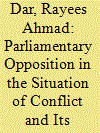| Srl | Item |
| 1 |
ID:
080824


|
|
|
|
|
| Publication |
2008.
|
| Summary/Abstract |
Contentious issues are important sources of militarized conflict. This article advances an issue-based approach to world politics, focusing on disagreements over territory, maritime zones, and cross-border rivers. We characterize militarized conflict and peaceful techniques as substitutable foreign policy tools that states can adopt to resolve disagreements over issues, and we present hypotheses to account for issue management based on issue salience and recent interaction over the same issue. Empirical analyses reveal that states are more likely to use both militarized conflict and peaceful methods when the issue at stake is more salient, both when the general issue type is considered more salient and when the specific issue under contention has greater within-issue salience. Recent issue management also plays an important role, as histories of both militarized conflict and failed peaceful settlements increase pressure to take further action to settle the issue
|
|
|
|
|
|
|
|
|
|
|
|
|
|
|
|
| 2 |
ID:
107967


|
|
|
|
|
| Publication |
2011.
|
| Summary/Abstract |
International relations scholars have garnered a good deal of evidence indicating that binding arbitration and adjudication are highly effective means for brokering agreements and ending conflict. However, binding third-party conflict management is rarely pursued to resolve interstate disputes over contentious issues like territorial or maritime control. While states value the effectiveness of binding procedures, they are reluctant to give up the decision control necessary to submit to arbitration or adjudication. The authors identify three factors that influence the willingness of states to give up decision control: issue salience, availability of outside options, and history of negotiations. An analysis of attempts to settle territorial, maritime, and river claims reveals that disputants are less likely to use binding conflict management when they have a greater need to maintain decision control.
|
|
|
|
|
|
|
|
|
|
|
|
|
|
|
|
| 3 |
ID:
160265


|
|
|
|
|
| Summary/Abstract |
Parliamentary opposition in the Kashmir valley frequently politicises the role of government by factoring in the contentious issues from the conflict politics. It questions the relevance and the legitimacy of the parties in power by setting the conflict politics as the main agenda before the government. The tactical representation of the conflict by the opposition parties, however, mainly serves to undermine the mainstream politics because of the presumed incapacity of the government to provide immediate solutions. The article aims to highlight that parliamentary political opposition more often than not engages uncritically with the emerging conflict situations without carving its own space for constructive political action. Nevertheless, its popular mandate allows it to be more effective and balanced in facing the conflicting parties and urging them to shun the attitude inimical to the peace and stability in the state. The article also highlights that government needs to accept the existence of hitherto absent parliamentary opposition more willingly and shun the averse attitude to evolve the space for concordant political action. Besides, it should not allow the whole space of political contention to slip into the exclusive domain of the opposition parties which only allows them to put it to the instrumental use against it.
|
|
|
|
|
|
|
|
|
|
|
|
|
|
|
|
| 4 |
ID:
122900


|
|
|
|
|
| Publication |
2013.
|
| Summary/Abstract |
Past studies have applied insights from the democratic peace to show that democracies are also less likely to sanction one another compared to other regime types. More recent work challenges this finding by arguing that the economic peace between democracies largely disappears once methodological improvements are included along with the particular behavior of the United States as market hegemon. This article cautions that these critiques may themselves be an artifact of particularities in past data on economic sanctions. Using a larger and more representative sanctions dataset, the analysis shows that democracies do seem less likely on average to sanction each other. Furthermore, the United States does not appear to be unique in its sanctioning behavior compared to other democracies. However, the article proposes a middle ground between proponents and skeptics of an economic peace between democracies. The analysis shows that the pacifying effects of joint democracy only operate for security related sanctions, while in non-security related matters democratic constraints are less evident. The results point to the importance of considering more closely the choice of data on sanctions, but also the need to take into account the issues under contention for episodes of economic coercion.
|
|
|
|
|
|
|
|
|
|
|
|
|
|
|
|